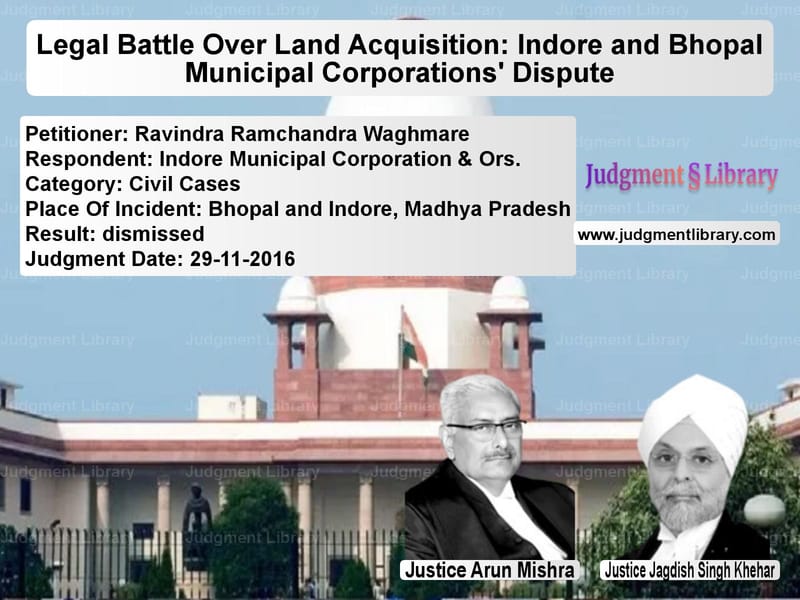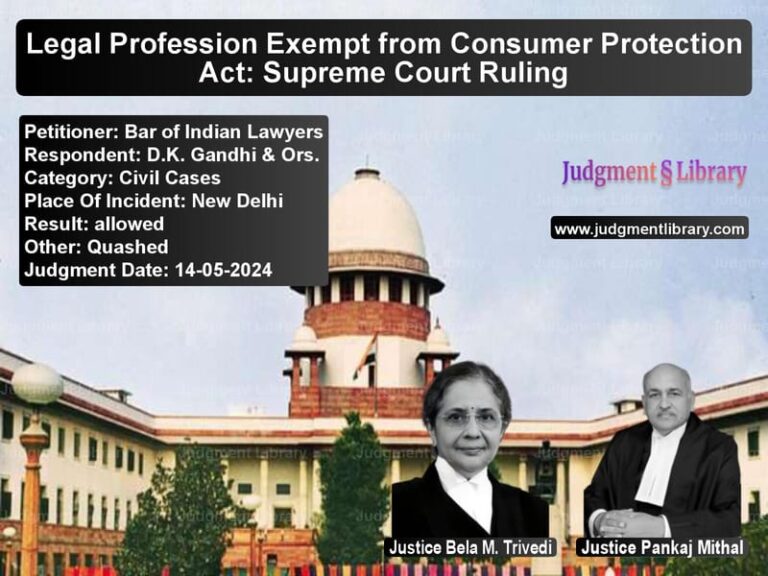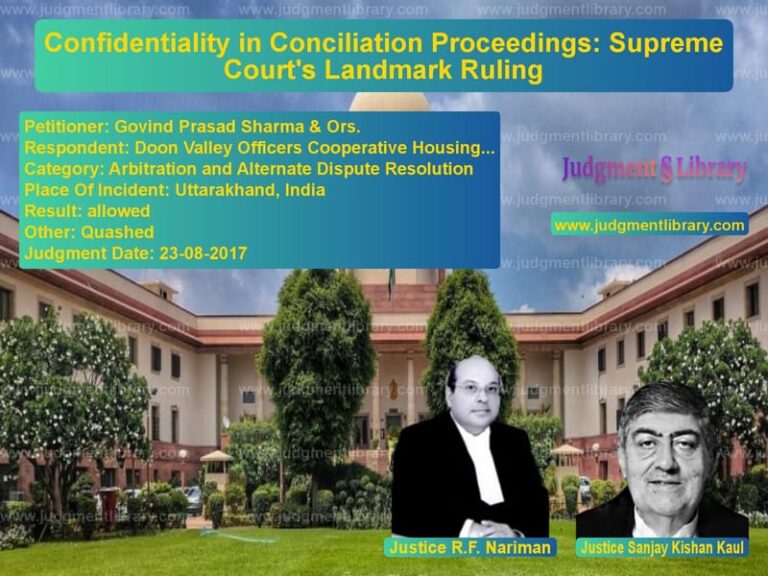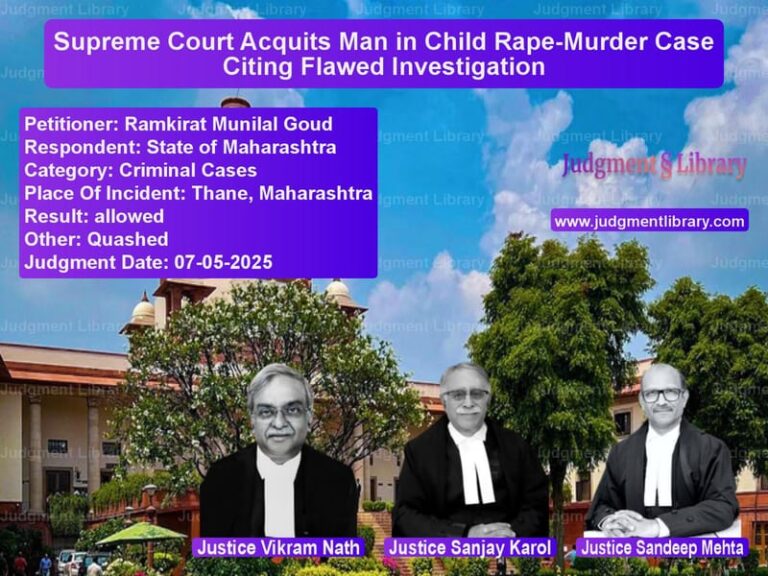Legal Battle Over Land Acquisition: Indore and Bhopal Municipal Corporations’ Dispute
The case of Ravindra Ramchandra Waghmare vs. Indore Municipal Corporation & Ors. is a landmark ruling by the Supreme Court of India, dealing with the contentious issue of land acquisition for public infrastructure. The dispute arose over the acquisition of private land for the Bus Rapid Transit System (BRTS) in Bhopal and Indore, invoking Section 305 of the Madhya Pradesh Municipal Corporation Act, 1956. The key legal issue in this case was whether municipal corporations could acquire private land for public streets without following the procedures laid down in the Right to Fair Compensation and Transparency in Land Acquisition, Rehabilitation, and Resettlement Act, 2013.
Background of the Case
The appeals stemmed from judgments of the Madhya Pradesh High Court, where landowners challenged the municipal corporations’ actions on the grounds that their land was being taken without due process and adequate compensation. The affected landowners contended that the municipal corporations had violated their fundamental rights by forcibly acquiring their properties without adhering to the provisions of the 2013 Act.
In various instances, private landowners were asked to vacate their properties under the pretext of urban development and road widening schemes. However, they argued that in other parts of the state, land was acquired under the 2013 Act, providing them with higher compensation and a transparent acquisition process. The inconsistency in applying different legal frameworks led to accusations of discrimination.
Petitioners’ Arguments
The petitioners, including affected landowners, made the following arguments:
- Their properties were forcibly acquired without following the provisions of the 2013 Act.
- The compensation provided under Sections 305 and 306 of the Madhya Pradesh Municipal Corporation Act, 1956, was inadequate and unconstitutional.
- The action of the municipal corporations violated Article 14 (Right to Equality) and Article 300A (Right to Property) of the Indian Constitution.
- The state government had arbitrarily applied different laws in different regions, leading to unfair treatment of landowners.
- Municipal corporations lacked the authority to acquire private land without following the due process outlined in the 2013 Act.
Respondents’ Arguments
The respondents, representing the Indore and Bhopal Municipal Corporations, countered these claims by stating:
- The land was acquired legally as per the development plan approved by the authorities.
- The action was in public interest, as road widening and infrastructure development were necessary to cater to increasing urban demands.
- Section 305 of the 1956 Act allowed municipal corporations to remove structures falling within the designated public street area.
- Compensation provisions under the 1956 Act were fair and reasonable, and landowners had been given an opportunity to claim compensation through arbitration under Section 387 of the Act.
- The affected landowners were aware of the development plan when they constructed their buildings, and thus could not claim surprise or unfair treatment.
Supreme Court’s Judgment
A two-judge bench comprising Justice Arun Mishra and Justice Jagdish Singh Khehar ruled in favor of the municipal corporations, upholding the legality of Sections 305 and 306 of the 1956 Act. The Court held that the law governing municipal land acquisition was valid and did not violate constitutional provisions.
The Supreme Court observed:
“Section 305 of the Act of 1956 has been enacted for the planned development of urban areas. It cannot be struck down as unconstitutional merely because the landowners believe that the 2013 Act provides them with a better compensation structure. The provision for arbitration under Section 387 is a sufficient safeguard to ensure fairness.”
The Court made several key findings:
- The municipal corporations had acted within their legal authority while acquiring land for public infrastructure projects.
- Section 305 did not violate Article 14 or Article 300A, as the law provided a clear mechanism for determining compensation.
- The compensation process through arbitration was a legally valid and adequate mechanism.
- Landowners were given due notice and had sufficient time to present their claims before the authorities.
- The development plan was binding, and landowners who constructed their buildings in designated public street areas could not later contest the acquisition.
The Supreme Court rejected the petitioners’ arguments that the acquisition should have been carried out under the 2013 Act, stating that:
“The Act of 1956 is a special law governing urban development, and its provisions cannot be overridden by a general law such as the Act of 2013. The two laws operate in different spheres, and municipal corporations are empowered to act under their governing legislation.”
Key Takeaways from the Judgment
- Validity of Municipal Land Acquisition: The ruling confirms that municipal corporations can acquire land under the 1956 Act without invoking the provisions of the 2013 Act.
- Compensation Through Arbitration: The judgment highlights that landowners have legal recourse through arbitration under Section 387, ensuring fair compensation.
- Planned Urban Development: The decision underscores the importance of maintaining clear urban planning policies while balancing individual property rights.
Impact of the Judgment
- Legal Clarity on Land Acquisition: The ruling provides municipal corporations with legal certainty regarding their powers under the 1956 Act.
- Implications for Landowners: Landowners affected by road widening projects may not be entitled to compensation under the 2013 Act, as long as the 1956 Act provisions are followed.
- Judicial Precedent: This decision sets a precedent for similar cases across India where municipal authorities acquire land for infrastructure projects.
Conclusion
The Supreme Court’s ruling in Ravindra Ramchandra Waghmare vs. Indore Municipal Corporation & Ors. reinforces the authority of municipal corporations in acquiring land for public infrastructure projects. By upholding the legality of Sections 305 and 306 of the 1956 Act, the Court has provided clarity on the role of municipal bodies in urban planning while balancing the rights of landowners.
This judgment ensures that public projects such as the BRTS can proceed without unnecessary legal hurdles while safeguarding property owners’ right to fair compensation through arbitration. The ruling sets a benchmark for future land acquisition cases, ensuring that development initiatives are carried out within a well-defined legal framework.
Don’t miss out on the full details! Download the complete judgment in PDF format below and gain valuable insights instantly!
Download Judgment: Ravindra Ramchandra vs Indore Municipal Cor Supreme Court of India Judgment Dated 29-11-2016.pdf
Direct Downlaod Judgment: Direct downlaod this Judgment
See all petitions in Property Disputes
See all petitions in Landlord-Tenant Disputes
See all petitions in Damages and Compensation
See all petitions in Judgment by Arun Mishra
See all petitions in Judgment by Jagdish Singh Khehar
See all petitions in dismissed
See all petitions in supreme court of India judgments November 2016
See all petitions in 2016 judgments
See all posts in Civil Cases Category
See all allowed petitions in Civil Cases Category
See all Dismissed petitions in Civil Cases Category
See all partially allowed petitions in Civil Cases Category







